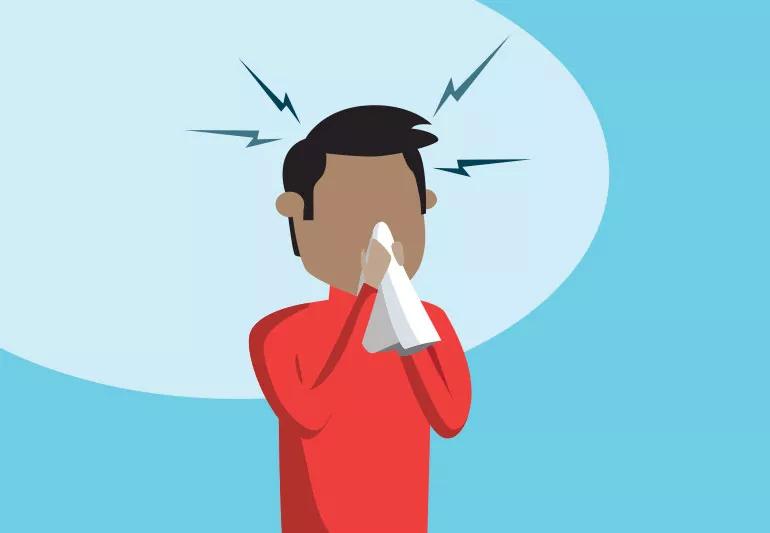Understand the cause to find relief

Image content: This image is available to view online.
View image online (https://assets.clevelandclinic.org/transform/fde8fb67-b7b9-42bb-beb0-96e7a6a277ac/sinusInfectn2-610744682-770x553_jpg)
Man with a headache wiping his nose
Living with one sinus infection after another can mean feeling as if you’re never at your best. Pain, trouble breathing and a limited sense of smell and taste can conspire to drag on your well-being.
Advertisement
Cleveland Clinic is a non-profit academic medical center. Advertising on our site helps support our mission. We do not endorse non-Cleveland Clinic products or services. Policy
Some studies have found people with long-term sinus infections, or chronic sinusitis, have a quality of life similar to those with life-threatening conditions like congestive heart failure, says Christopher Roxbury, MD, a rhinologist, or expert in disorders of the nose and nearby sinuses.
Learning what’s causing your sinus infections is a crucial first step to finding relief. There are treatments for recurrent sinus infections, but their effectiveness depends on getting at the source of the illness.
One less well-known cause of sinus infections is “nasal polyps,” which are small, grapelike growths. They’re located in the nose or sinuses, which are made up of connected cavities, or spaces, in the head.
Nasal polyps are non-cancerous, but they can block nasal and sinus passages, causing sinus infections and breathing problems. Though doctors don’t know exactly why some people get nasal polyps, the growths are caused in general by inflammation of these passages.
The first step to learning whether nasal polyps are behind your repeated sinus infections is to figure out which of the two major types of sinusitis you have, Dr. Roxbury says.
When sinus infections get better within a week or two, called an “acute” infection, they are more likely to be caused by a bacteria or virus, like the common cold.
Advertisement
“People with an acute bacterial sinus infection typically notice an improvement of their symptoms after about one week, followed by a sudden worsening of symptoms such as pressure in the face combined with a stuffy and runny nose,” Dr. Roxbury says.
These types of infections often get better on their own but may be treated with antibiotics.
(If you’re not sure whether you have a sinus infection in the first place, check out our guide.)
But when they last for 12 weeks or longer, sinus infections become “chronic.” In these cases, nasal polyps may be to blame because, unlike a bacteria or virus, they don’t go away without treatment.
Long-term problems aren’t the only sign of nasal polyps.
Common symptoms of chronic sinus infections tend to be similar to those of short-term infections. They include:
When he’s seeing a patient with chronic sinusitis, Dr. Roxbury is looking for a few hints that polyps could be involved. They include:
There is a quick and relatively painless procedure to examine the nasal and sinus passages. It’s called a nasal endoscopy, and it involves the use of a camera attached to a thin telescope that allows doctors to search for polyps or other problems.
It only takes about a minute, and though it is mildly uncomfortable, a spray used to numb the area minimizes pain.
Dr. Roxbury says many of his patients know about the connection between colon polyps and cancer and ask whether the same is true of nasal polyps. The short answer is no.
Nasal polyps are benign and have no ability to change into cancer. That said, it’s a good idea to get growths in the nose and sinuses checked out because other less common and more dangerous conditions may mimic polyps.
Learning you have nasal polyps is the first step to finding relief.
First-line treatments for nasal polyps are typically saltwater rinses and nasal steroid sprays, Dr. Roxbury says.
“These approaches can offer benefits in the short term by reducing symptoms, but they typically only last a matter of weeks,” he says.
If those approaches don’t work, more powerful anti-inflammatory medications and surgery may be the next steps. First, a computed tomography (CT) scan is used to see if other issues, including a deviated septum, are causing the problem.
Because the sinuses are so close to the eyes and brain, sinus surgery is usually guided using CT scan and navigation technology.
Advertisement
Even when they’re removed surgically, polyps may come back. That’s why follow-up treatment tends to include measures to reduce the swelling that may have caused the polyps in the first place.
Advertisement

Delivered every Tuesday!
Sign up for our Health Essentials emails for expert guidance on nutrition, fitness, sleep, skin care and more
It's a letter about the news!

Every two weeks once
Sign up for our Health Essentials emails for expert guidance on nutrition, fitness, sleep, skin care and more.
Learn more about our editorial process.
Advertisement
Most recommended precautions center around minimizing bruising or swelling
Even one drink can have an impact on your cognitive function leading to slurred speech, blurred vision and impaired memory
Understand who may (and may not) benefit
Lorem ipsum dolor sit amet. Et odio Quis vel ipsam omnis eum alias deleniti et placeat impedit non voluptas galisum hic autem enim et cupiditate aliquid. Est beatae quidem non facilis autem ut commodi nisi aut tempore rerum et dolores voluptatem cum enim optio id sapiente quasi. Ad laboriosam officiis 33 cupiditate sequi ea voluptatum consectetur qui necessitatibus voluptate et quasi doloremque et facere explicabo quo explicabo officia
Seeking help through therapy can be an important step in improving your quality of life when you have UC
Type 2 diabetes isn’t inevitable with these dietary changes
Applying a hot or cold compress can help with pain
Pump up your iron intake with foods like tuna, tofu and turkey